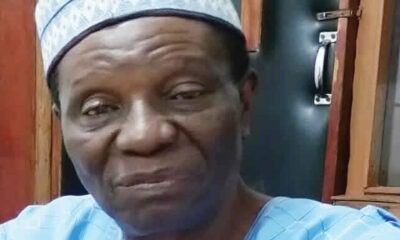Political Issues
A Question For Our Lawmakers On National Anthem Debate: “Can A Hungry Man Muster The Strength To Sing?” -By Isaac Asabor
In fact, the anthem’s opening lines echo, “Arise, O compatriots, Nigeria’s call obey…” more often than not at various events reverberate across stadiums, schools, and official gatherings. It is no doubt a call to unity, resilience, and unwavering loyalty. But what happens when the compatriots are famished, their ribs playing a desperate symphony of need? Can they rise, hearts swelling with pride, when their stomachs are hollow?

In the midst of Nigeria’s pressing hardships, lawmakers have recently turned their attention to an unexpected issue: the national anthem. This is as the proposal to revert to the old anthem, “Nigeria, We Hail Thee,” has sparked debate and raised eyebrows. But is this really the priority Nigerians need right now?
The House of Representatives swiftly passed a bill advocating for the return to the old national anthem during a recent plenary session. The bill, sponsored by House Leader Prof. Julius Ihonvbere, emphasizes the anthem’s significance as a national symbol and a sign of authority. However, not everyone is on board.
The Minority Leader, Rep. Kingsley Chinda, voiced opposition to the bill. He pointed out that the old anthem carries a colonial legacy, as it was composed during British rule. Chinda questioned the relevance of this change when the country faces more urgent challenges. And he has a point.
In concurrence with Chinda’s objection to the issue in this context, it is germane to opine that not a few Nigerians are presently grappling with a myriad of issues on daily basis. From economic instability to security threats, the average citizens are more concerned about putting food on the table, finding employment, and ensuring their safety. Without a doubt, the old anthem, while nostalgic, would not alleviate these struggles.
Instead of debating anthems, lawmakers should focus on addressing the root causes of Nigeria’s woes. They should rather focus on good governance, transparency, and accountability, which are no doubt essential. The reason for the foregoing contextual advocacy cannot be farfetched as Nigerians deserve leaders who prioritize their well-being over symbolic gestures.
While the old anthem may evoke memories of unity and pride, it would not fix the broken healthcare system, unemployment rates, or security challenges. Let us hope our representatives redirect their efforts toward meaningful solutions, before legislating on national anthem.
Given the foregoing backdrop, it is expedient to ask, “When Stomachs Growl, Can Souls Sing?” The answer to the foregoing question cannot be farfetched, particularly when appraised from the standpoint of the fact that hunger is at the moment gnawing at the very fabric of existence of not a few Nigerians. In fact, appraised from the foregoing perspective, it is not an exaggeration to opine that the lawmakers have embarked on a curious quest by legislating on the national anthem. Permit this writer to sound poetic over the proposal, and harangue that as the sun sets over parched fields and empty bellies, one cannot help but wonder: “Can a hungry man muster the strength to sing? The juxtaposition of these two realities, the lyrical verses of patriotism and the growling chorus of hunger, hence the expediency of asking our lawmakers again, “Can A Hungry Man Muster The Strength To Sing? The reason for the foregoing question cannot be farfetched as it creates a dissonance that echoes through the corridors of power.
In fact, the anthem’s opening lines echo, “Arise, O compatriots, Nigeria’s call obey…” more often than not at various events reverberate across stadiums, schools, and official gatherings. It is no doubt a call to unity, resilience, and unwavering loyalty. But what happens when the compatriots are famished, their ribs playing a desperate symphony of need? Can they rise, hearts swelling with pride, when their stomachs are hollow?
To this writer, the proposal of replacing the extant anthem with the old anthem tantamount to misplacement of priority, and seems the lawmakers are yet to come to grip with the level of hardships which virtually all Nigerians are facing since May 29, 2023 when the present administration been led by President Bola Ahmed Tinubu commenced. In fact, the lawmakers cannot be blamed as they are usually ensconced in air-conditioned chambers, and therefore imbued with the inspiration of debating the minutiae of anthem legislation. They dissect syllables, ponder punctuation, and argue over the right crescendo. Meanwhile, outside those hallowed walls, millions of Nigerians are suffering as feeding in many households has literarily become a capital project. Their voices, too weak to reach the marble halls, are drowned out by the cacophony of bureaucracy.
Aptly put, the hungry man’s dilemma in Nigeria has today become very obvious. Picture this: A man, ribs protruding, stands before the flag. His parched lips quiver, and his eyes search for sustenance. The anthem begins, and he tries to sing. But the words stick in his throat like crumbs of dry bread. His hunger eclipses patriotism; survival outdoes symbolism. Can he truly sing when his body is a battleground?
To this writer, singing the national anthems with empty stomachs is nothing but a national paradox. The reason for the foregoing view cannot be farfetched as the hungry man literarily stumbles away from the flagpole, defeated by both hunger and anthem. Given the foregoing graphic picture of the stark realities, we must question our priorities. Legislation should nourish the soul, not starve it. Perhaps our lawmakers should trade their pens for spoons, and legislate food for food drives. Let them taste the bitterness of hunger, and then, perhaps, they will compose a new anthem, one that resonates with the rumbling bellies of the forgotten.
In this land of contradictions, where anthems soar and stomachs ache, let us remember that true patriotism lies not in words alone but in deeds that fill empty plates. Until then, let the anthem play, but may the hearts of our lawmakers and other politicians in the executive and judicial arms of governments sing a different tune, one of compassion, action, and shared humanity.
At this juncture, it is expedient to enlighten our honorable lawmakers that anthem notes versus empty bellies tantamount to a dissonance of priorities. In fact, they should be reminded that in the grand theater of life, where hunger takes center stage, the national anthem plays softly in the background. Its verses echo through the hearts of compatriots, urging them to rise and unite. But as the hungry man gazes at the flag, his stomach aching, he wonders: “Can patriotism fill an empty belly?”
The anthem’s melody, though stirring, cannot nourish. It does not butter bread or put food on the table. It does not quell the pangs of hunger or soothe the cries of malnourished children. It remains a beautiful abstraction, an ethereal symphony, while the real orchestra of survival plays on.
So let this writer ask: When a hungry man stands before the flag, can he muster the strength to sing? Or does his hunger eclipse patriotism, rendering the anthem a hollow echo?
Perhaps, it is time for a new anthem, one composed not of words alone but of deeds that fill empty plates. Until then, let the anthem play, but may the hearts of our leaders sing a different tune, one of compassion, action, and shared humanity. To rest my pen, it is expedient to opine that the hunger crisis in Nigeria demands urgent attention. Let us raise our voices not only in anthem but also in advocacy for those who hunger for more than word.










